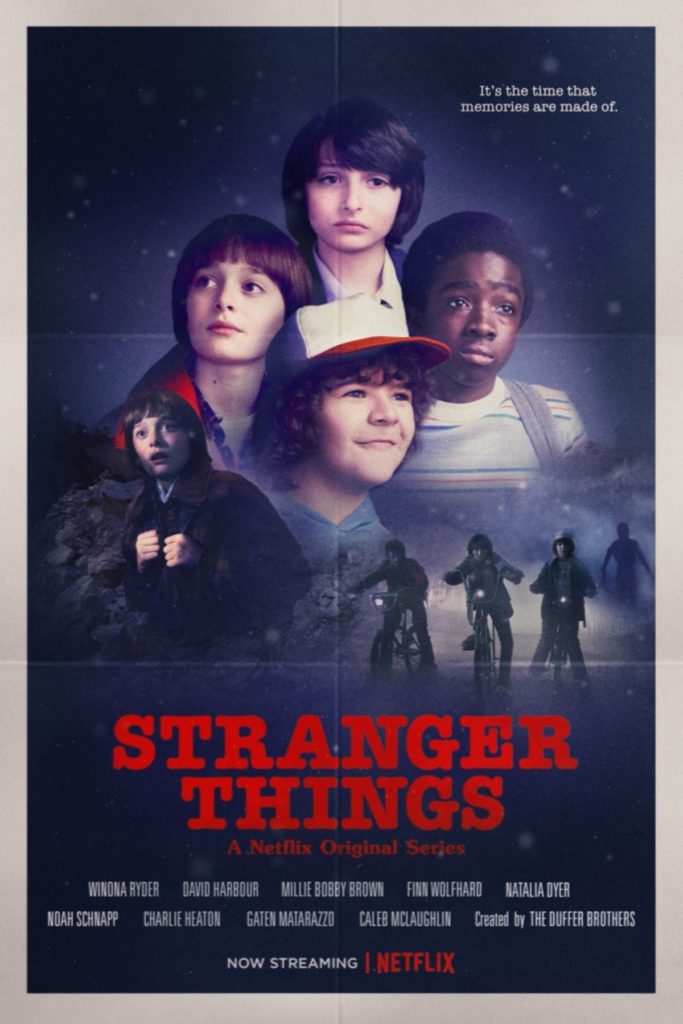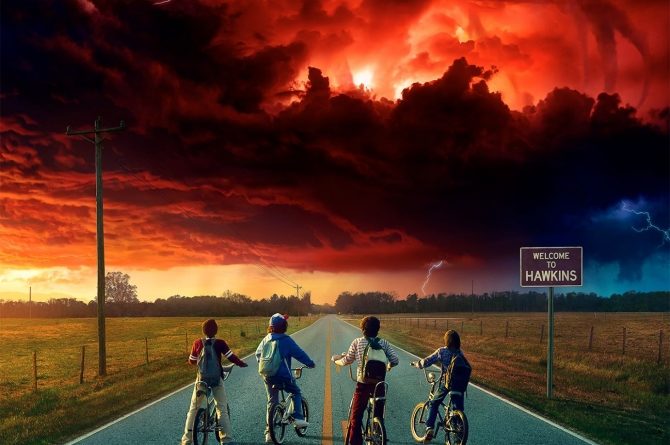Netflix’s “Stranger Things” is a Marvelous Thing

The much anticipated second season of Netflix’s “Stranger Things” premiered on Fri, Oct. 27 and received universal praise. In fact, Rotten Tomatoes gave the new season a 94 percent fresh rating and the series overall has currently earned an impressive 95 percent.
Not only is it one of the most successful streaming programs on television, it has also become an international phenomenon over the past year. It seems as if the Emmy award-winning series and its talented cast are everywhere you look. Target stores are carrying an exclusive merchandise line and the show has partnered with both Eggo and Hellman’s for promotions.
Disclaimer: This review will strive to respectfully refrain from spoiling major plotlines and twists, despite the gifs and tweets trending buzzing around social media from fans.
The nostalgic Netflix’s series “Stranger Things” is a love letter to the 80s. It affectionately celebrates the decade’s cultural contributions while never ripping them off. Each homage is thoughtfully placed into The Duffer Brothers’ original story.
Matt and Ross Duffer, the creative minds behind the show, use their series to showcase a clear understanding that 80s cinema was just as rich in its storytelling as it was in its aesthetics. On the surface it looks like a genre show; however, “Stranger Things,” at its core, chooses to focuses on more universal themes such as the power of friendship, family dynamics, the importance of individuality and coming of age stories rather than just sci-fi scares.
Its soundtrack is effective in scoring emotion without invading or exploiting the moment. The brilliant balance of horror and heart makes the series feel like a cross between Stephen King and Steven Spielberg, respectfully. Think “E.T.” and ‘The Goonies” meets “Stand by Me” and “IT.”
The freshmen season of “Stranger Things,” currently streaming in its entirety on Netflix, pulled off a feat that many shows struggle within their first year: It was able to establish its voice and characters clearly, making it easier for an audience to feel more immersed and emotionally invested.
Set in the fictional town of Hawkins, Indiana during the early 80s, the episodes depict the investigations of the disappearance of Will Byers (Noah Schnapp) and arrival of a mysterious girl named Eleven, a force to be wrecked with who is brought to life by actress Millie Bobby Brown in her Emmy-nominated performance.
Instead of relying on the standard tropes of cop shows, “Stranger Things” find its own voice by spreading the investigation responsivities among the police, Will’s family, and his friends who are helped by Eleven herself. Moreover, the way these three groups work as an ensemble rather than constantly being in contention is refreshing. This may be why the show was given the outstanding dramatic ensemble award by the Screen Actors Guild.
As Will’s grieving mother who refuses to accept her son is dead, Winona Ryder carries the role of Joyce Byers with a quiet strength and an almost whimsical quality that convinces the audience that stranger things are possible to not only exist but also be defeated. The supernatural elements of the presences of The Upside Down in Hawkins never feel cheesy, cheap or campy. Almost as if it were magical realism, the threat of the Demogorgon feels believable in the show’s world that is governed by the principles of both physics and “Dungeons and Dragons.”
Known as “Stranger Things 2” (a title which is a throwback to how film franchises defined the 80s), the sophomore season is stronger, spookier and stranger, bringing depth to the overall story rather than outshining its previous season. They work beautifully together, but also apart. Most importantly, it achieves everything that a great sequel should: taking the elements of its predecessor that worked well and finding a way to explore them in new ways to expand the story rather than just imitate it.
Picking up a year after the first season’s finale, the second season effectively uses flashbacks to help bridge the time gaps. While Will spent most of season one in the Upside Down, many of the storylines concern themselves with how Will is coping with life since being rescued. Having such a skilled young actor in the role of Will brings new energy to the episodes as they showcase Schnapp’s emotional range. The audience being able to see the world through Will’s eyes and feel included in his journey is largely why season two works.
While Will remains much of the overlaying focus of the plot, the new episodes leave space for most of the characters to have their own storylines outside of saving Will again. Dustin Henderson (the adorable Gaten Matarazzo) establishes his own connection to The Upside Down while Lucas Sinclair (Caleb McLaughlin) goes head to head with MadMax. Selfless as ever, Mike Wheeler (the magnetic Finn Wolfhard) is able to remain an emotional powerhouse that is a touchstone for both Will and Eleven.
Remaining more than just the older siblings of Mike and Will, respectively, Nancy Wheeler and Jonathan Byers (Natalia Dyer and Charlie Heaton) seek justice for the beloved Barb. Another element that was successfully executed was in how The Duffer Brothers altered the dynamics of the group. The decisions to have Steve Harrington, (the hilarious and too handsome Joe Keery) join forces Will’s friends and pair Eleven off with Hopper were big risks that were worth it.
The only blemish in this near perfect season lies in the controversial seventh episode, “The Lost Sister.” Essentially, it feels like a standalone episode and does not incorporate enough “Stranger Things” DNA, which throws off the continuity and interweaving of the other storylines/episodes. While some are still divided, the majority of critics and fans find this episode, which focuses solely on Eleven’s journey to Pittsburgh, to have been a waste of precious airtime. When a show only chooses to have nine episodes in their season, they need to use their limited running time wisely. The content of the episode would have been better presented if it were dispersed over more than one episode rather than detaching itself in one character-centric episode that stirs too far away from plotlines back in Hawkins. Since “Stranger Things” has always excelled in balancing an abundance of characters effortlessly, having one episode that throws away the established chemistry feels out of place.
Furthermore, there has been criticism that Eleven’s season two arc does the character an injustice through her isolation from most of the cast. It must be remembered that Eleven’s ability to function in society after years of imprisonment and abuse will take time. And if anything, her season two story arc with Hopper is one of the most emotionally-poignant and essential additions to the story.
As Chief Jim Hopper, David Harbour, also in an Emmy-nominated role, is the heart of the series. In a performance that dares to bring a genuine vulnerability to compliment his rugged masculinity, Chief Hopper is a selfless, emotionally committed cop who, although flawed, always has good intentions. His complexity and grief fuel his commitment rather than creating conflict. There is something classic yet complicated about him: equally parts John Wayne, Jimmy Stewart, and Marlon Brando.
Another impressive triumph of season two is in how it efficiently incorporated new characters. Whomever thought to add Sean Astin of the 80s classic “The Goonies” to the cast is a genius. Astin excels in playing underdogs and loyal friends. His spirit and that of “Stranger Things” are one in the same. As Bob Newby, his presence is like a warm embrace, making you wish he had been there from the start.
While the show ultimately encourages fans to continue to want childhood friends/obvious soulmates Hopper and Joyce to be together and live happily ever after, the love triangle between the two and Bob never casts anyone in a demeaning light. None of them exist solely to function within the triangulation, which allows Bob to make a lasting impact on everyone around him.
Sadie Sink joins Will’s friend group in the role of Max. As a girl from an abusive home, she, in her own way, has lived in The Upside Down. While she rightfully never feels like a replacement for Eleven, Max finds her own place within the group; although her brother Billy (Darce Montgomery) feels more like a monster for her to defeat rather than a dimensional character himself.
Comedian Paul Reiser makes an effective dramatic turn as Dr. Sam Owens, Will’s therapist. Brett Gelman is great as the eccentric conspiracy theorist Murray Bauman; however, something about his performance makes you wish Nic Cage were in the role instead of him. Nic Cage definitely would have taken the job, too, because as his resume in the past two decades indicates, he will basically be in anything.
Lastly, Catherine Curtin is perfect as Dustin’s mother and Priah Ferguson is a riot as Erica Sinclair, Lucas’ sassy and shady younger sister.
The second season of “Stranger Things” is a triumph that has proven the series worthy of all the hype and the wait. In addition, Netflix is now airing “Beyond Stranger Things” which is a post season talk show with the cast.
Whether you are returning to or just moving in, Hawkins feels like home despite the pending doom of the Demogorgon. A character study such as this excels in the binge format to be devoured all at once on the streaming service; however, something this rich can be enjoyed over and over so that you do not miss out on all it has to offer.

